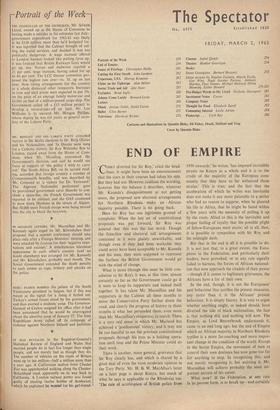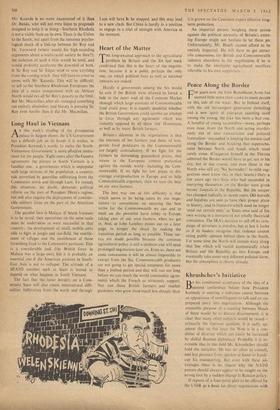END OF EMPIRE
'Comm- diverted for Sir Roy,' cried the head- lines. It might have been an announcement that the stars in their courses had taken his side. But they had not. However cautious the wording, however fine the balance it describes, whatever Mr. Kaunda's disappointment at not getting more, the proposed new electoral arrangements for Northern Rhodesia make an African majority possible. There is no going back.
Here Sir Roy has one legitimate ground of complaint. When the last set of constitutional proposals was put forward, Sir Roy was assured that this was the last word. Though the franchise and electoral roll arrangements contained in it were plainly unworkable, and though even if they had been workable they could never have been acceptable to Mr. Kaunda and his men, they were supposed to represent the furthest the British Government would go with the wind of change.
What is more (though this must be little con- solation to Sir Roy), it was, at that time, almost certainly as far as the Government could go if it were to keep its supporters and indeed itself together. It has taken Mr. Macmillan and his supporters in the Cabinet all these months to move the Conservative Party farther down the road; and clearly the progress of history in those months is what has persuaded them, even more than Mr. Macmillan's eloquence, to march. There is a very real sense in which Mr. Macleod has achieved a `posthumous' victory, and it may not be too fanciful to see the previous constitutional proposals through his eyes as a holding opera- tion until time and the Prime Minister could do their work.
There is another, more general, grievance that Sir Roy clearly has, and which is shared by a good deal of even the most moderate opinion in the Tory Party. Mr. H. B. W. MacAllan's letter on a later page is about Kenya; but much of what he says is applicable to the Rhodesias too. `The rate of acceleration of British policy from 1959 onwards,' he writes, `has imposed incredible strains on Kenya as a whole and it is to the credit of the majority of the European com- munity that they have so far withstood those strains.' This is true; and the fact that the acceleration of which he writes was inevitable does not make it any more palatable to a settler who had no reason to suppose, when he planted his life in Africa, that he might be faced within a 'few years with the necessity of pulling it up by the roots. Allied to this is the inevitable and *per feeling of loyalty that the possible plight of fellow-Europeans must excite; all in all, then, it is possible to sympathise with Sir Roy and his midnight dash.
But that in the end is all it is possible to. do. It is not just that, to a great extent, the Euro- peans in the Federation, and particularly their leaders, have provoked, or at any rate signally failed to harness, the forces of African national- ism that now approach the citadels of their power --though if it comes to legitimate grievances, the Africans have a list of their own.
In the end, though, it is not the Europeans' past behaviour that justifies the present measures, any more than it is the Africans' present behaviour. It is simply history. It is vain to argue whether anything might, or indeed should, have diverted the tide of black nationalism; the fact is that nothing did, and nothing will now. The Empire, as Lord Beaverbrook understands it, came to an end long ago; but the end of Empire which an African majority in Northern Rhodesia typifies is a more far-reaching and more impor- tant change in the condition of the world. Except in the Soviet Empire, the movement of men to control their own destinies has now gone too far for anything to stop. In recognising this, and not merely recognising it, but assisting it, Mr. Macmillan will achieve probably the most im- portant success of his career.
What now? If the Federation, at any rate in its present form, is to break up—and certainly Mr. Kaunda is no more enamoured of it than Dr. Banda, who will not even listen to proposals designed to keep it in being—Southern Rhodesia is not a viable State on its own.There is the Union to the South; but apart from the immense psycho- logical shock of a link-up between Sir Roy and Dr. Verwoerd (where would his high-sounding arguments about a multi-racial society be then?), the isolation of such a bloc would be total, and would probably accelerate the downfall of both. If Sir Roy and Sir Edgar•wisk to save anything from the coming wreck. they will have to come to terms with Mr. Kaunda. This will be difficult; to sell to the Southern Rhodesian Europeans the idea of a major compromise with an African North would tax all Sir Roy's powers to the limit. But Mr. Macmillan, after all, managed something not entirely dissimilar; and history is pressing Sir Roy even harder than it did Mr. Macmillan.



































 Previous page
Previous page